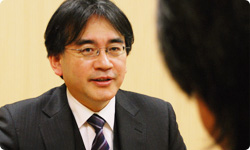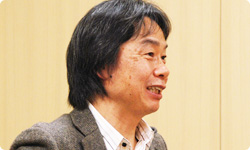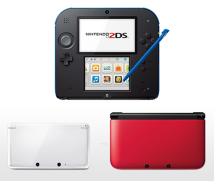10. Ocarina of Time is a Special Game
Here's my last question, then. There's been a huge response to this remake of The Legend of Zelda: Ocarina of Time, particularly from those who played it all those years ago. What do you think it is that makes Ocarina of Time a special game for so many people?
Hmm.... What indeed? I don't understand it all that well myself.
Of all the Zelda games, you were very deeply involved with Ocarina of Time.
I was. I think I was most deeply involved in that one.
That just may be the answer, right there. (laughs)
No, no. (laughs)
Well, to me, it seems as though Mario 6418 and Ocarina of Time laid the foundation for modern 3D games, to a great extent. For example, I think that even 3D games from widely different genres were influenced by those two. 18Mario 64 = Super Mario 64. The first 3D action game of the Super Mario series, released in June of 1996 in Japan for the Nintendo 64.

Hmm... I wonder. I really don't know about that.
How should I put it? It seems to me that there were a lot of "first experiences" in those games.
Ah, you're right. One of the biggest features of Ocarina of Time may be that it has so many firsts packed into it. And then, this might sound a little technical, but the Ocarina game is built, not from a story, but from elements and composition.
Elements and composition.
Right. There are people who wrote the story, and of course, if you have no story, you're in trouble. But, more than the story itself, I think the various character settings and other factors are what make the fundamentals of the game come to life. In other words, it isn't that there's a certain worldview and a certain story around which the characters and items and landscapes are constructed. The heart of Ocarina of Time lies in what the individual designers composed with the elements produced by the person in charge of writing the story.
I see.
The theme of Ocarina is very simple: it's about a child becoming an adult. There are people who watch over that protagonist. There are many encounters and partings, and the three women. We protected that structure. But if you just scatter that theme and story around a landscape, it won't make the game interesting.
Right, right.
So, what is it that makes it interesting as a game? The foundation lies in the puzzles that have appeared in The Legend of Zelda games since the first game. It's taking that traditional series material and skilfully transposing it to 3D that really makes the game The Legend of Zelda. When we took series elements and used 3D composition, things just got more and more interesting.
I see. That's how Ocarina was produced.
Right. And then, there's really no way around it; we had the most freedom with Ocarina in that respect.
Because it was the first 3D Zelda game.
That's right. It was the most primitive, and the most free. That's all there is to it. It isn't that subsequent games lost that freedom, only that the games which were put out later simply had more things which needed to have attention paid to them. Of course, even Ocarina had traditional elements dating from Link to the Past19 for the Super Nintendo, so it wasn't completely free. It's just that it was the first 3D Zelda, and we were able to explore what would be most interesting about making it in 3D without worrying about much else. I think that may be a big part of it. 19Link to the Past = The Legend of Zelda: A Link to the Past. An action-adventure game released in November of 1991 in Japan for the Super Nintendo Entertainment System.

Ah, yes, I see. In other words, as long as you kept the basic composition of the fun of 3D and the traditional puzzle-solving, you were free to design however you liked. Then lots of new things and Zelda series traditions that worked well just soaked in.
Yes, that's right.
That's why, even as they experience new things one after another, players will feel that this is definitely The Legend of Zelda.
I think that's probably it. This is a bit of a difficult topic, though; maybe I shouldn't have gone into it here. (laughs)
(laughs) But it's really very interesting. You see, we've never actually talked about why Ocarina of Time is evaluated as prominent before. Because if we didn't phrase things correctly, it could sound as though we don’t value new things as much.
That's just the same as with the first Star Wars: the first one really is special. But, it isn't about which one's better.
Yes, that's true.
It isn't about skill or quality. Again, it's the same with the first Star Wars: when I look at Ocarina now, the graphics are really rough. So rough that I think it's a wonder people actually played it.
Well, but the way I remember it, it didn't seem rough at all. I felt as if I was seeing incredible graphics. I remember this part well: Ocarina of Time was the first video game in which looking down from a high place made me feel a bit weak in the knees.
That's actually more due to the camerawork than to the graphics. At the time, the phrase “cinematic game” was used mostly in regard to graphics, but to me, that wasn't what cinematic really meant. I thought what we should really be learning was how to use camera techniques to explain situations.
Ahh, I see.
I spoke about this back then, too, but when the camera is up above you, and you're being watched from that angle, you feel that there's somebody up there. When you want to make it clear that a place is so high it makes your legs go weak, you change the camera angle slightly depending on how high the character has climbed, and when he reaches the top, you slide the camera up farther and make players look down.
So you included filming techniques like that.
That's right. The skilful use of cuts can make a fighter jet and pilot look cool; we did things like that in Star Fox, but I think it was in Ocarina of Time that we first saw clearly that we could use cinematic camerawork as a production technique.
It seems to me that the whole game exudes that thrill of your discoveries.

Yes. It's like that precisely because it's a first game.
Well, I feel that I've started to understand, little by little, what makes Ocarina of Time special. Of course, the Nintendo 3DS version of Ocarina of Time is crammed with interesting things that weren't in the Nintendo 64 version, but we’ll wait to talk about those after release.
Right. (laughs)
I'll expect lots of stories from you then. Still, to think it's been thirteen years already...
I know. My kid was in the upper years of Primary school... Oh, that's right; one thing I remember very well from that time was when my wife saw our child playing Ocarina of Time. She said, "When I'm just looking at it, I think it's pretty, but I'd never want to try it." I thought, "Something has to be done about this!" (laughs)
Yes, I remember that. (laughs)
I mean, she'd never really cared about games at all before, and here she was, finally showing an interest, and yet.... It felt as though a customer had come right up to the entrance, but then she'd turned around and gone back home.
The roots of your later "expanding the gaming population" concept can be traced to that incident, right?
They can. (laughs) I thought, "No! I was so close!" That's what started it.
That was a good story to end on. (laughs) Thank you very much for your time today.
Thank you.
